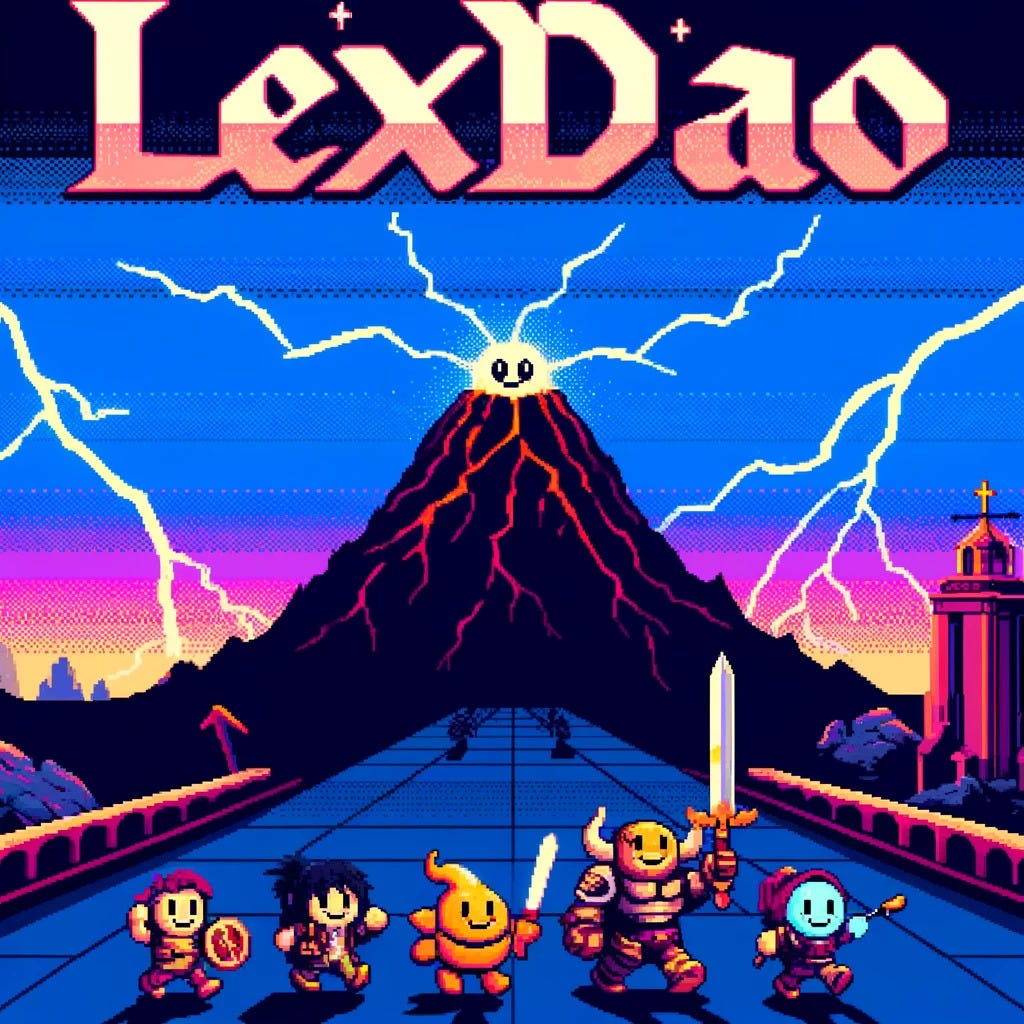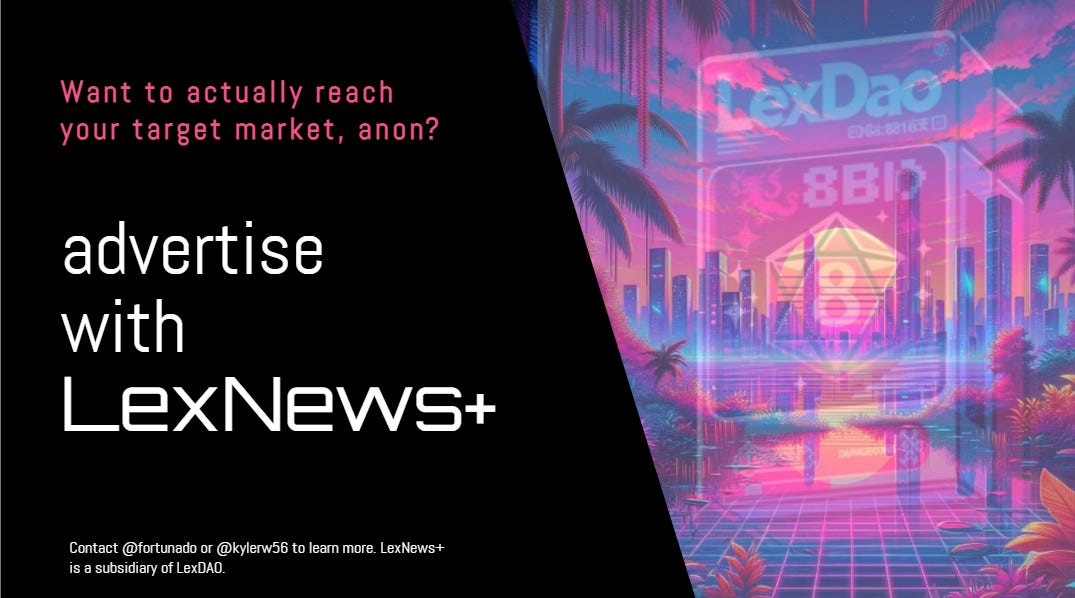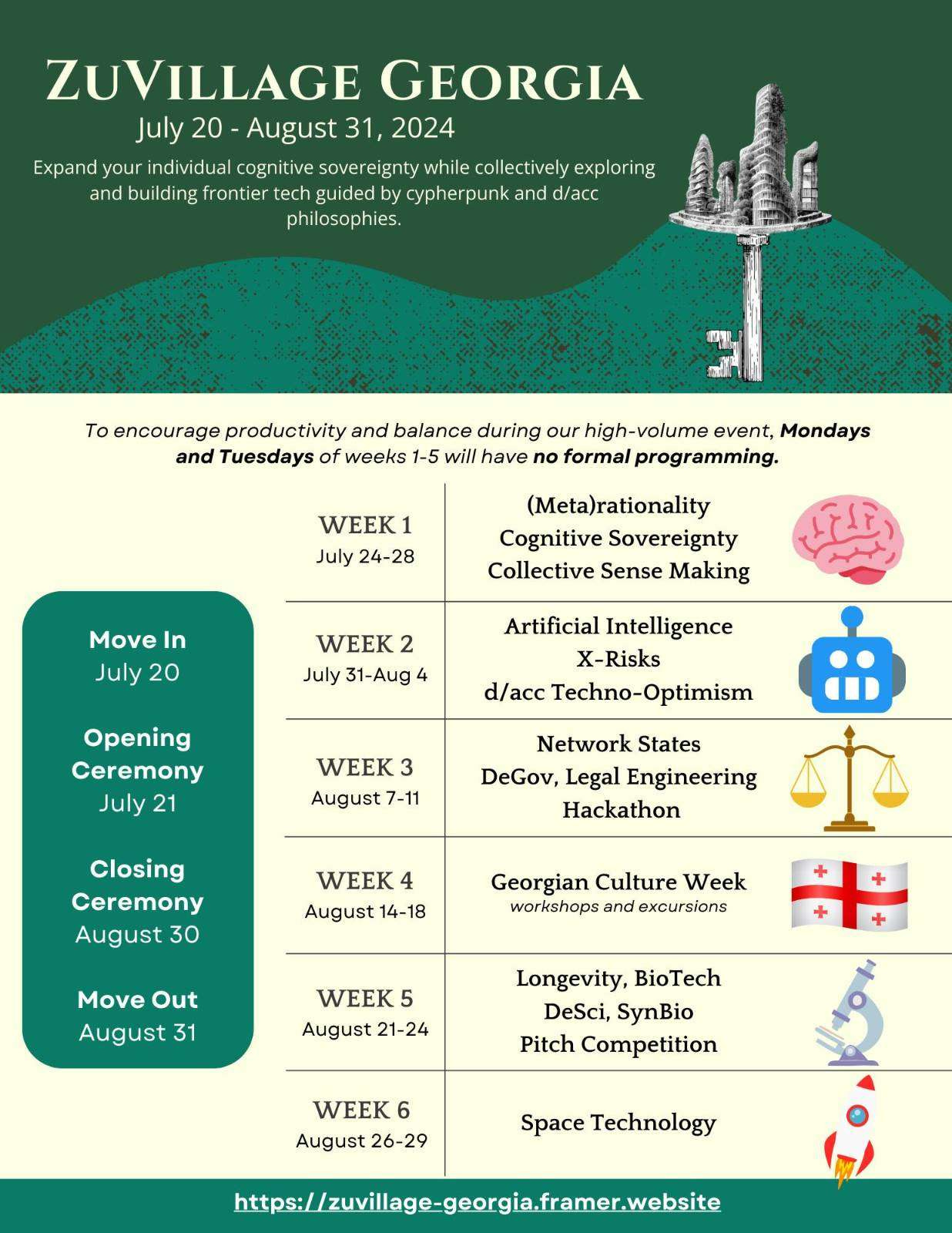Congratulations, folks. We have officially crossed the halfway point for 2024. In celebration of this truly unbelievable milestone (no, seriously, where did the time go?), we bring you another HOT edition of the monthly newsletter. This edition will be sure to make you sweat, and that is not my heat stroke talking! So pour yourself your chilled beverage of choice, put on some sun screen, and join us as we dive into the latest happenings.
What’s New at LexDAO
Call them super humans, call them lunatics, or call them fanatics. As long as you call them, the LexDAO team will gladly accept your recognition. And boy is it well deserved! This team keeps on pumping out more hits than Quincy Jones in the 80s. But talk is cheap, so keep reading to see what they have been working on.
LexNews+ Weekly Highlights
written in part by Kyler (@kyler56)
The crypto law news never stops. But fear not, for LexDAO’s Kyler (@kyler56) is back again with the pure, concentrated news to pour directly into your brain. In case you missed it, here is some of what was talked about this month:
1. VanEck applies for Solana ETF; Solana announces Blinks
VanEck has officially applied for a Solana ETF, aiming to list it on the Cboe BZX Exchange. This application marks a significant move in the crypto financial landscape, reflecting VanEck's belief that Solana should be classified as a commodity, similar to Bitcoin and Ethereum. This strategic classification aims to navigate the stringent regulatory framework imposed by the SEC, which often categorizes altcoins as securities, posing potential challenges for the ETF's approval. (CoinDesk) (VanEck)
In a bid to further integrate blockchain technology with traditional web applications, Solana has introduced a new feature called Blinks. This innovative feature allows developers to incorporate blockchain functionalities directly into Web2 applications, thus bridging the gap between the two ecosystems. Blinks aims to streamline the user experience by enabling seamless interactions with blockchain features without requiring extensive blockchain knowledge or the need to switch between platforms (Bitcoin News) (Bitcoin News).
2. Robert Robb pleads guilty to MEV fraud scheme, faces 20 years in prison
Robert Wesley Robb, a 46-year-old Colorado resident, has plead guilty to wire fraud for defrauding investors through a series of misrepresentations and high-pressure tactics. According to court documents, Robb advertised an opportunity to invest in a Maximum Extractable Value (MEV) cryptocurrency trading bot via social media on September 4, 2023. He targeted individuals with significant funds, encouraging them to invest at least $100,000 quickly. An investigation revealed that Robb had defrauded over ten investors of more than $2.2 million, using the funds for personal expenses such as luxury items, vacations, and cars. Significant expenditures included $204,423 for an executive suite at the Denver Broncos' stadium and $117,570 for a 2023 Jeep Wagoneer.
Robb is scheduled for sentencing on October 2 and faces up to 20 years in prison. The case is being prosecuted by Assistant U.S. Attorneys Zoe Bedell and Katherine E. Rumbaugh, and was announced by Jessica D. Aber, U.S. Attorney for the Eastern District of Virginia, and David J. Scott, Special Agent in Charge of the FBI Washington Field Office's Criminal and Cyber Division.
For more details, refer to the press release from the U.S. Attorney’s Office for the Eastern District of Virginia, or to ZachXBTs thread on X.
3. The DJT Memecoin Controversy Involving Martin Shkreli and Barron Trump
The DJT memecoin controversy has recently captivated the crypto community, involving claims that former "Pharma Bro" Martin Shkreli and Barron Trump, son of former President Donald Trump, were behind the creation of this Solana-based token.
Shkreli, infamous for his pharmaceutical price-gouging scandal, initially denied involvement but later claimed in a livestream and through various social media posts that he co-created the DJT token with Barron Trump. Shkreli asserted he had "over 1000 pieces of evidence" proving his involvement, further stating that Barron held the private keys to the token's smart contract. This revelation came amidst a $150,000 bounty offered by Arkham Intelligence to identify the token's creator, which crypto investigator ZachXBT reportedly solved by linking Shkreli to the project (The Daily Dot) (Cointelegraph).
Despite these assertions, neither Donald Trump nor Barron Trump have officially commented on the matter. Roger Stone, a close Trump ally, denied any involvement from the Trump family, suggesting that Shkreli's claims were unfounded. The controversy intensified with significant trading volumes and value spikes in the DJT token, driven by speculation and rumors about the Trump family's involvement (Cointelegraph) (markets.businessinsider.com).
During his social media frenzy, Shkreli also provoked and insulted widely respected cryptolawyer Stephen Palley, a move considered unwise by some:
For further reading, check out the detailed reports on Cointelegraph and The Daily Dot.
4. Chevron overturned by the Supreme Court
The U.S. Supreme Court has recently overturned the landmark Chevron deference doctrine, a significant shift that could reshape the regulatory landscape for startups and the cryptocurrency industry. The Chevron doctrine, established in 1984, mandated that courts defer to federal agencies' interpretations of ambiguous statutes. This deference allowed agencies to wield substantial power in shaping regulations across various sectors, including finance and technology (SCOTUSblog) (Home | Holland & Knight).
For startups, particularly those in highly regulated industries like fintech and biotechnology, the overturning of Chevron could introduce both challenges and opportunities. On one hand, the reduction in agency power might result in a less predictable regulatory environment. Agencies like the SEC and FDA, which have previously enjoyed broad interpretative leeway, may now face increased judicial scrutiny, leading to more litigation as courts, rather than agencies, become the primary interpreters of statutory ambiguities. This shift could result in regulatory delays and increased legal costs for startups navigating compliance issues (Home | Holland & Knight).
The cryptocurrency sector, which has often found itself at odds with regulatory bodies like the SEC, could see significant impacts from this ruling. Agencies have in the past used Chevron deference to justify their expansive regulatory actions over digital assets. The removal of this deference means that courts will now play a more active and democratic role in interpreting how existing laws apply to cryptocurrencies.
See Chief Justice John Robert’s Majority Opinion here for more details.
5. SEC Charges ConsenSys with Securities Violations Amid Regulatory Shifts and Leadership Changes
The Securities and Exchange Commission (SEC) has charged ConsenSys, the blockchain technology company behind the popular MetaMask wallet, with securities violations. This move comes as the SEC intensifies its scrutiny of the cryptocurrency industry, despite recent legislative and judicial setbacks.
The SEC alleges that ConsenSys violated securities laws through its MetaMask Swaps and MetaMask Staking features. According to the SEC, by operating MetaMask Swaps, ConsenSys acted as an unregistered broker-dealer, which breaches the Exchange Act. Additionally, the SEC claims that MetaMask Staking constitutes an unregistered securities offering under the Securities Act. ConsenSys has pushed back against these allegations, emphasizing that their software is non-custodial and does not handle users' tokens directly (Blockworks).
Broader Regulatory Context:
This enforcement action occurs amid significant regulatory shifts. The Supreme Court's recent decision to overturn the Chevron deference limits federal agencies' power to interpret ambiguous statutes. This change is likely to increase judicial scrutiny of regulatory actions, potentially complicating the SEC's efforts to impose new rules on the rapidly evolving crypto sector (SCOTUSblog) (Home | Holland & Knight).
Moreover, the SEC has faced political pressure and legislative challenges that have curtailed its regulatory ambitions. These setbacks, combined with the Chevron ruling, may embolden industry players to contest the SEC's regulatory reach more aggressively (SCOTUSblog).
Leadership Changes:
The SEC's enforcement landscape is also shifting with the recent resignation of David Hirsch, the head of the SEC’s Crypto Assets and Cyber Unit. Hirsch, who played a key role in high-profile cases against major crypto companies like Binance and Coinbase, announced his departure after nearly a decade at the SEC. His resignation adds to the uncertainty within the regulatory agency as it continues to grapple with the complexities of cryptocurrency regulation (Crypto Briefing).
Work for Membership (w4m) Bounties
The LexDAO hackathon has generated a bunch of bounties which are suited for non-lawyers wishing to learn as they go in lieu of the $300 membership fee. A pioneer along this journey is Chris Dike who wrote an article on Wyoming DUNA law, then submitted a proposal to raise awareness in another DAO, with the expectation of landing commissioned legal research.
The roles are roughly based on the RaidGuild handbook with some variants from MetaGame. We do not supervise l'externs but use passive tracking tools such as sourceCred to ensure that all participants satisfy the 15 hour requirement (often by committing their work to the github repo).
LexDAO Study Group Session Q Blockchain
LexDAO’s Paolo Maria Gangi (@pmgangi on Discord and @PaoloMGangi on X) hosted another Study Group Session on Tuesday, June 25. This session focused on Q Blockchain and DAO governance, how Q Blockchain’s new framework for DAO governance functions, and risk management for DAOs. The panelists in this Study Group Session included Nimro Knoller and Martin Schmidt from Q, Tertius (@Tertius), Operator for LexDAO, Cimply (@Cimply), Assistant Operator for LexDAO, and Ramona Tudorancea from LexDAO and Ixian (@GoldenLady on Discord and @JupiterBlock on X). Together they explored various aspects of Q’s proposals system, including root nodes and their impact on governance, various legal and jurisdiction considerations, and the onboarding process for projects wishing to use Q Blockchain.
Traditional systems expose projects to various attack vectors, including internal community shifts and external takeovers. Q aims to mitigate these risks through a three-layered approach: a legally binding constitution, root nodes that enforce contracts on-chain, and a mechanism for creating and submitting proposals. Q’s governance framework allows projects to opt-in for additional security on critical governance elements, such as treasury decisions and system upgrades. Root nodes, which include entities like LexClinic, play a crucial role in interpreting and overseeing the rules of the governance frameworks. These nodes can exercise veto rights in certain instances, ensuring that decisions align with the DAO's constitution.
DAOs face unique risks, such as governance attacks, financial and technical risks, and participant risks. Q blockchain's design, particularly its root nodes, could significantly reduce participant risk and attract high-quality contributors by providing a more resilient and credible governance structure. Throughout the discussion, several themes emerged, including the importance of simplifying the onboarding process for projects using Q blockchain, the need for legal expertise in DAO governance, and the potential for Q blockchain to support a constellation of legal entities across various jurisdictions. Q blockchain's agnostic approach to jurisdiction and its modular design aim to enable cross-chain governance security, making it a versatile tool for DAOs seeking to enhance their governance frameworks.
The conversation underscored the ongoing need for innovation in the realm of DAO governance. Q blockchain represents a significant step forward in addressing the complexities of decentralized governance, offering a framework that balances the need for legal enforceability with the flexibility and autonomy that DAOs require. As the space continues to mature, collaborations between legal experts, developers, and DAOs will be crucial in shaping governance models that are secure, transparent, and adaptable to the diverse needs of decentralized communities.
A link to a recording of the Study Group Session will be circulated soon, so keep an eye out. If you would like to learn more about future Study Group Sessions or get involved, please visit our Discord or reach out to Paolo directly! And if you would like to learn more about Q, visit their website!
LexDAO Study Group on Kleros
Following on the heels of the DUNA Study Group’s success, LexDAO’s Paolo Maria Gangi (@pmgangi) hosted another study group session on Kleros, the decentralized arbitration center, on Monday, June 3. This Study Group will be moderated by Paolo and feature several panelists: Ines Braganza, Stephen Palley, Alexandre Perez, Alexandru Stanescu, and Facundo Trotz.
We thank all of our panelists for joining and lending their unique perspectives on decentralized arbitration. Please visit our Discord or reach out to Paolo directly to learn more about LexDAO’s Study Group Sessions!
Upcoming Events
ZuVillage Georgia
For anyone interested in exploring and building frontier tech guided by cypherpunk and d/acc philosophies, ZuVillage Georgia, a popup village for truth seekers, builders, and sovereign individuals, will be taking place from July 20 through August 31, 2024 in the Georgian mountains. ZuVillage Georgia iterates on Zuzalu in Montenegro 2023 and will build a cypherpunk mountain village for 2 months this summer.
Co-live with aligned and ambitious people, build transparent and privacy-preserving digital public goods while competing in hackathons, discuss the future of Zuzalu, and explore a techno & crypto-progressive country while getting to know local innovators and youth.
Anyone interested in learning more can read the ZuVillage Wiki and you can apply here to participate.
MCON III
Metacartel is hosting MCON III on September 26 - 28, 2024 in Detroit, MI. This will be “…a [three day] gathering of dynamic DAO Operators, Governerds, and Builder-Philosophers to reconnect to the vision and values of decentralization, and dive deep into innovative onchain experiments and the spiciest topics of Web3.” LexDAO will be joining the event as co-organizers and sponsors. Any and all LexDAO members interested in attending should reach out today to get involved!
Like what you see?
LexDAO relies on donations from the community to maintain our operations and continue delivering content and resources to the web3 community. If you enjoy our work, please consider donating! Visit https://lexdaogrant.us to see how you can contribute. We thank you for your continued support!
Get Involved!
LexDAO is always looking for new members! If you are interested in the work we are doing:
Check out our Discord and ask some questions or DM our Assistant Operator Cimply (@cimply) with any onboarding questions.
Join our bi-monthly governance calls on Wednesdays at 12pm EST in Discord!
When you are ready, check out the LexDAO website for more information on how you can become a part of our growing community of builders, thinkers, and legal explorers!













